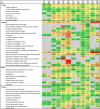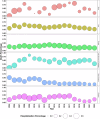Global disparities in drug-related adverse events of patients with multiple myeloma: a pharmacovigilance study
- PMID: 39706832
- PMCID: PMC11661995
- DOI: 10.1038/s41408-024-01206-4
Global disparities in drug-related adverse events of patients with multiple myeloma: a pharmacovigilance study
Abstract
Multiple myeloma (MM) is a complex hematological malignancy of clonal plasma cells driven by alterations to the chromosomal material leading to uncontrolled proliferation in the bone marrow. Ethnic and racial disparities persist in the prevalence, diagnosis, management, and outcomes of MM. These disparities are multifaceted and intersect with various factors, including demographics, geography, socioeconomic status, genetics, and access to healthcare. This study utilized the openFDA human drug adverse events (AEs) to analyze global data pertaining to MM patients and patterns of treatment-related AEs. We identified ten most frequently used drugs and drug regimens in six distinct regions, including North America (NA), Europe (EU), Asia (AS), Africa (AF), Oceania (OC), and Latin America & the Caribbean (LA). AE patterns were evaluated using the reporting odds ratio combined with a 95% confidence interval. AE reports were more prevalent in men than in women across all regions. Cardiotoxicities were more likely observed in AS and EU, while secondary neoplasms were more frequently reported in the EU. Nephropathies were prominent in OC, AF (in males), and AS (in females), while vascular toxicity, including embolism and thrombosis, was more common in NA (in males). A notable improvement in survival, particularly in AS, EU, and NA, with a significant decline in death rates was observed. Hospitalization rates displayed less variation in AS and EU but exhibited more pronounced fluctuations in AF, LA, and OC. In conclusion, this comprehensive analysis offers valuable insights into the demographic, geographic, and AE patterns of MM patients across the globe.
© 2024. The Author(s).
Conflict of interest statement
Competing interests: Majid Jaberi-Douraki accepted funding from BioNexus KC for this project (BioNexus KC 20-7 Nexus of Animal and Human Health Research Grant). Sikander Ailawadhi has a consulting relationship with GlaxoSmithKline (GSK), Sanofi, Bristol Myers Squibb Foundation (BMS), Takeda, Beigene, Pharmacyclics, Amgen, Janssen, Regeneron, Cellectar, Pfizer and research funding (outside of this study) from GSK, BMS, Pharmacyclics, Amgen, Janssen, Cellectar, Abbvie, Ascentage. Faiz Anwer has consulting relationships with BMS, Caribou Biosciences and received research funding (outside of this study) from Celgene, Acetylon Pharmaceuticals, Millennium, Astellas Pharma, AbbVie, Janssen, Bristol Myers Squibb, and Caribou Biosciences. Dr. Sandra Mazzoni has a consulting agreement with Janssen/J&J Consulting. Shahzad Raza received an honorarium as an advisory board for Pfizer, Prothena Biosciences, and KiTE pharma and received research funding (outside of this study) from Nexcella Inc, Poseida Therapeutics and Janssen. The other authors declare no conflicts of interest.
Figures




References
-
- Benjamin M, Reddy S, Brawley OW. Myeloma and race: a review of the literature. Cancer Metastasis Rev. 2003;22:87–93. - PubMed
-
- Mikhael J, Cichewicz A, Mearns ES, Girvan A, Pierre V, Rawashdh NA, et al. Overall survival in patients with multiple myeloma in the U.S.: a systematic literature review of racial disparities. Clin Lymphoma Myeloma Leuk. 2024;24:e1–e12. - PubMed
-
- Intzes S, Symeonidou M, Zagoridis K, Bezirgianidou Z, Vrachiolias G, Spanoudaki A, et al. Socioeconomic status is globally a prognostic factor for overall survival of multiple myeloma patients: synthesis of studies and review of the literature. Mediterr J Hematol Infect Dis. 2021;13:e2021006. - PMC - PubMed
Publication types
MeSH terms
Substances
LinkOut - more resources
Full Text Sources
Medical
Research Materials

